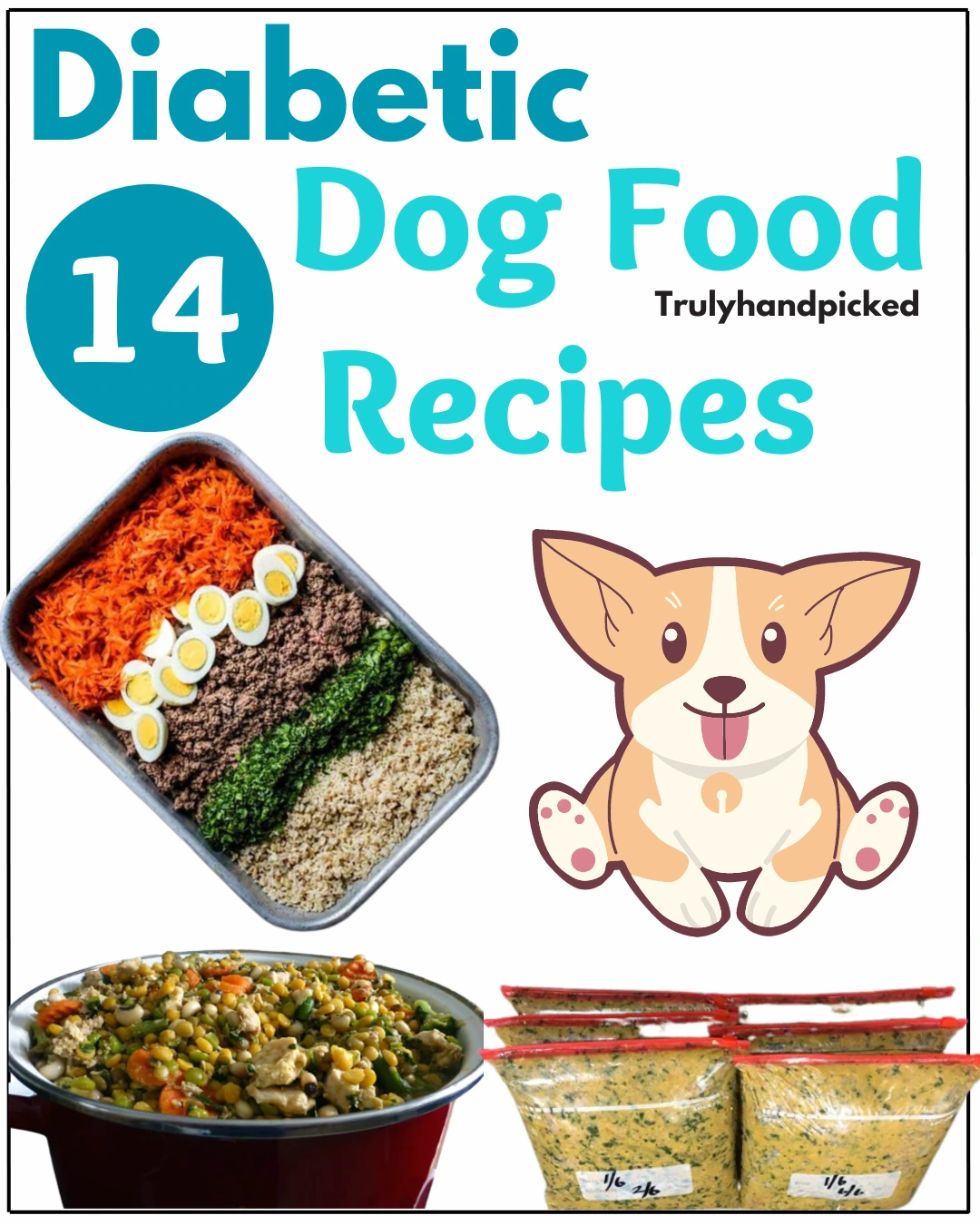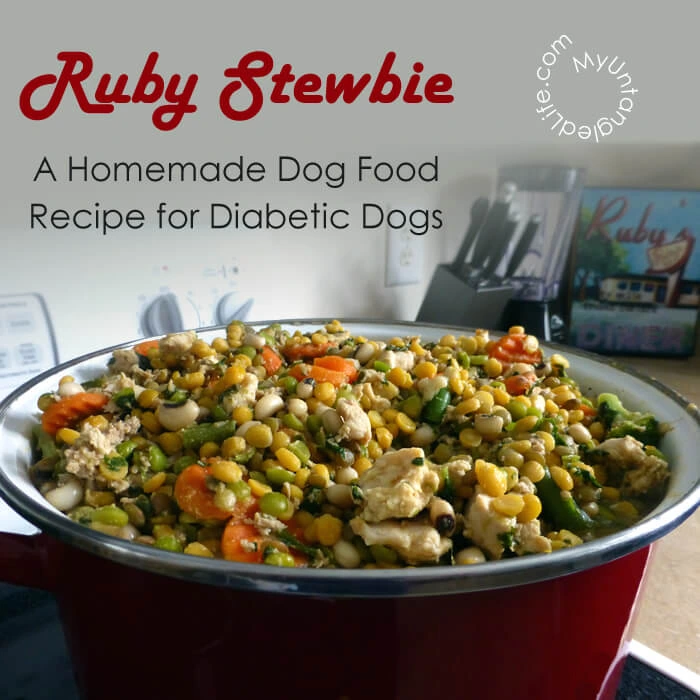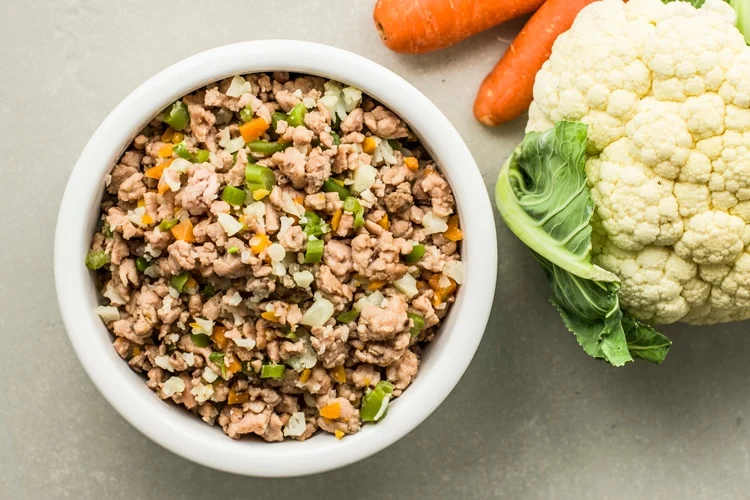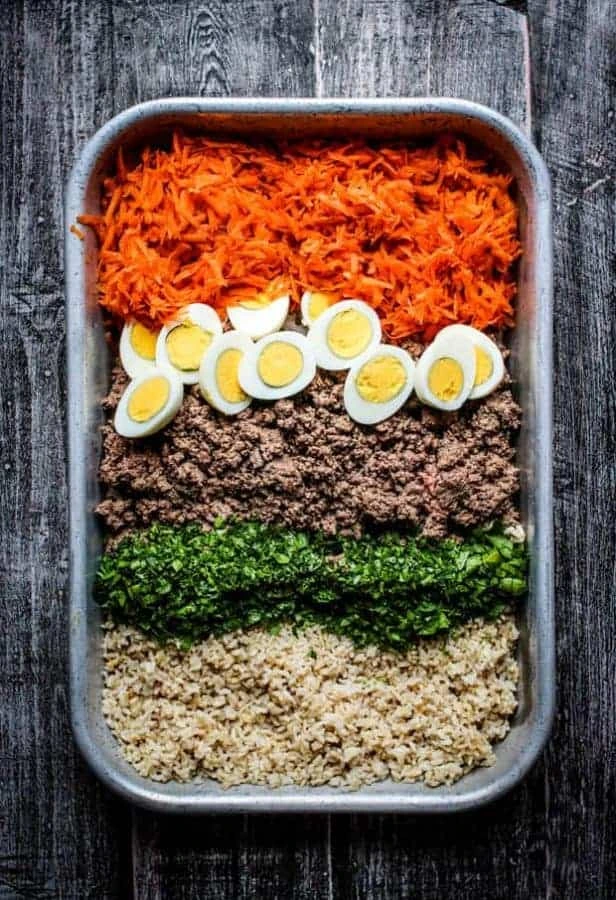Hey there, fellow dog lovers! 🐾 Let’s talk about our adorable furry friends and something that’s super important for their health: diabetic dogs and their special nutritional needs!
Contents: Apart from a list of diabetic food recipes, learn about diabetic dogs, nutrition needs, good food sources, need for nutrients, and exercise. Diabetes, diet management, and low glycemic index foods.
🐶 A word of advice:
-
- Before making any dietary changes for our diabetic dogs, it’s essential to consult trusted veterinarians.
- Each dog is unique, and their diabetes management may require individual adjustments.
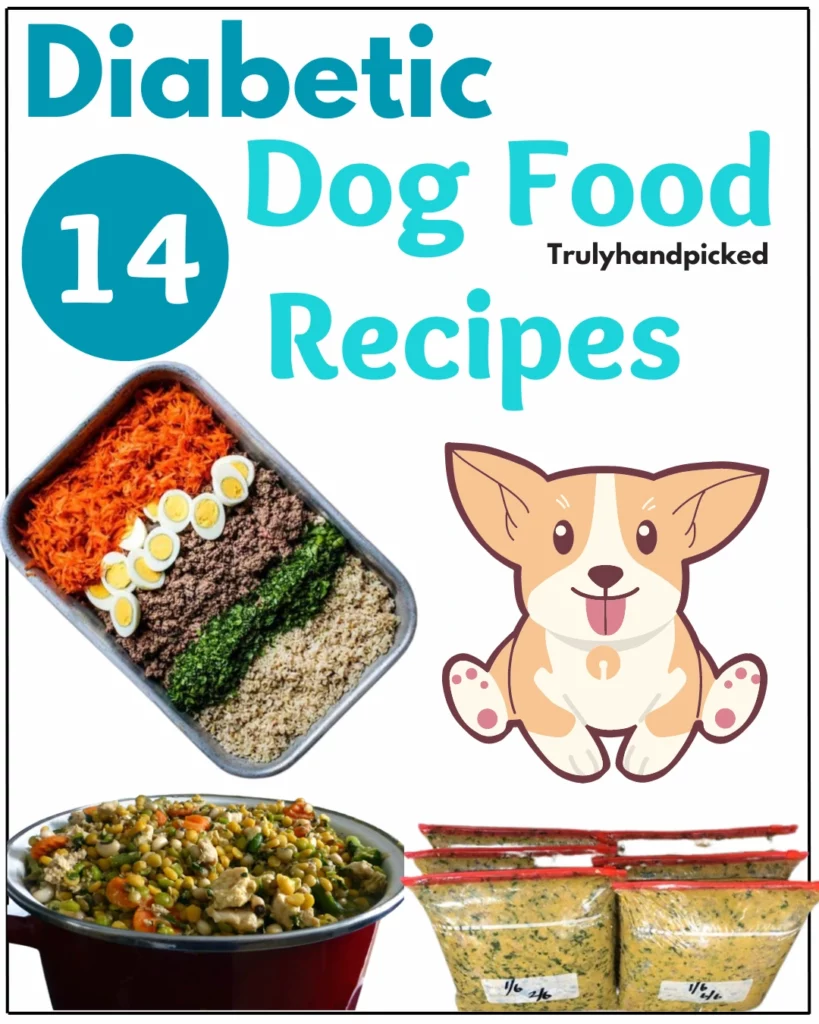
Healthy Homemade Dog Food for Diabetic Dogs
- Ruby Stewbie – Diabetic dog story and a healthy channa dal loaded Low GI stew recipe – Myuntangledlife
- Chicken Casserole make with chicken, veggies, low sodium broth, and oats –Topdogtips
- Homemade Dog food with carrot, lentils, chicken, and spinach –Thealmondeater
- Diabetic dog treats: contains a list of healthy treats and foods to avoid –Thesaltypot
- Chicken and Rice with Carrots- Azestfor
- Diabetic dog treat with liver, wheat, and eggs –doobert
- Diabetic dog food bowl with chicken, brown rice, veggies, and bone meal –Topdogtips
- It a Food for all dogs and yes for Diabetic dogs too ( beef, carrots, celery, and barley) – Food
- Ground Turkey nutritious food bowl with chicken liver and veggies –skinnyms
- Grains-free homemade food with chicken, beans, berries, and spinach – All recipes
- Make ahead dog food recipe loaded with chicken breast, apples, carrots, olive oil, and peas – Skinnyms
- A story about her dogs and homemade dog food with pumpkin, chicken, broccoli, and rice (yes) –carolynburnsbass
- Vitamins diabetic dog food recipe loaded with beef barley and veggies – Food
- Easy Homemade food recipe with brown rice, eggs, lean beef, and carrots – thismessisours
Diabetic Dogs
First things first, what is diabetes in dogs? Well, just like humans, dogs can develop diabetes too.
It’s a condition where their bodies have trouble regulating blood sugar levels, which can lead to some health challenges.
But fret not, with the right care and nutrition, we can help our four-legged pals lead happy and healthy lives!
Some dog-friendly food sources that are rich in essential nutrients
- Protein:
- Cooked Chicken: A lean source of protein that dogs love. Avoid seasoning or added salt.
- Turkey: Another lean and delicious protein option for our canine companions.
- Salmon: Rich in omega-3 fatty acids and an excellent source of protein.
- Fiber:
- Pumpkin: A great source of fiber that helps regulate digestion and promote a healthy gut.
- Sweet Potatoes: Packed with fiber, vitamins, and minerals that dogs enjoy.
- Green Beans: Low in calories and high in fiber, making them a crunchy and healthy treat.
- Omega-3 Fatty Acids:
- Fish Oil: Provides essential omega-3 fatty acids, supporting skin, coat, and joint health.
- Chia Seeds: These tiny seeds are rich in omega-3s and can be sprinkled on your dog’s food.
- Flaxseeds: Another fantastic source of omega-3s for dogs, best when ground for better absorption.
- Vitamins (Biotin, Vitamin E, Vitamin C):
- Eggs: A fantastic source of biotin, vitamin E, and other essential nutrients for dogs.
- Spinach: High in vitamin C and antioxidants, this leafy green is great for dogs in moderation.
- Blueberries: Packed with vitamin C and antioxidants, dogs enjoy these as a tasty treat.
- Minerals (Calcium, Zinc, Iron):
- Cottage Cheese: A calcium-rich option that some dogs love (check for lactose intolerance).
- Beef Liver: Provides zinc and iron, but should be fed in moderation due to its richness.
- Broccoli: Contains calcium and iron, offering a healthy addition to your dog’s diet.
- Antioxidants:
- Carrots: A crunchy and nutritious snack, rich in antioxidants like beta-carotene.
- Apples: A dog-friendly fruit providing antioxidants, fiber, and vitamin C.
- Cranberries: These tart berries offer antioxidants and can help support urinary health.
Remember, it’s essential to introduce new foods gradually and in moderation, paying attention to any possible allergies or sensitivities your dog may have.
Low Glycemic Dog Food & Benefits
🍽️ What is low-glycemic dog food?
- Low-glycemic dog food is specially designed to have a lower impact on our furry pals’ blood sugar levels.
- It contains carbohydrates that are slowly digested and absorbed, leading to a gradual and steady release of glucose into the bloodstream.
🌟 The benefits for our diabetic dogs:
- Blood Sugar Stability: Since low-glycemic food causes a slow and steady rise in blood sugar, it helps avoid sudden spikes and crashes. This is crucial for our diabetic dogs, as it promotes stable blood sugar levels.
- Weight Management: It can be a great ally in maintaining a healthy weight. Stable blood sugar levels can prevent excessive hunger, leading to better portion control and weight management.
- Energy Levels: Diabetic dogs often struggle with fluctuating energy levels. Low-glycemic food provides a consistent source of energy, helping them stay active and vibrant throughout the day.
- Reduced Insulin Demands: With stable blood sugar levels, our furry friends may require less insulin or other medications, making diabetes management a bit smoother.
- Improved Overall Health: By supporting stable blood sugar levels, low-glycemic dog food can contribute to better long-term health and potentially reduce the risk of complications associated with diabetes.
- Satiety and Satisfaction: High-fiber content in low-glycemic food can help our dogs feel full and satisfied, reducing the chances of them begging for treats or snacks between meals.
💡 How to find the right low-glycemic dog food:
- Look for labels mentioning “low-glycemic” or “slow-release carbohydrates.”
- Check the ingredient list for whole, natural ingredients like whole grains, fruits, and vegetables.
- Avoid foods with high levels of processed grains and sugars.
Nutrition and Diet & Exercise
Now, I can’t stress enough how crucial proper nutrition is for our diabetic pups. I’m here to share my love for dogs and my commitment to giving them the absolute best care possible.
You see, what our diabetic furry pals eat plays a massive role in their overall well-being.
How each nutrient contributes to overall health and diabetes management in dogs
- Protein:
- Supports muscle maintenance and repair, essential for overall strength and mobility.
- Helps regulate blood sugar levels, preventing sudden spikes.
- Fiber:
- Aids in digestion and promotes a healthy gut, reducing the risk of constipation.
- Slows down the absorption of glucose, stabilizing blood sugar levels.
- Omega-3 Fatty Acids:
- Promotes healthy skin and a shiny coat, a sign of overall well-being.
- Reduces inflammation and supports joint health, crucial for active dogs.
- Vitamins (Biotin, Vitamin E, Vitamin C):
- Biotin helps maintain healthy skin and a lustrous coat.
- Vitamin E protects cells from damage and supports the immune system.
- Vitamin C is an antioxidant that boosts the immune system and helps fight infections.
- Minerals (Calcium, Zinc, Iron):
- Calcium maintains strong bones and teeth, essential for an active lifestyle.
- Zinc supports the immune system and aids in wound healing.
- Iron is vital for the production of healthy red blood cells, preventing anemia.
- Antioxidants:
- Neutralize harmful free radicals, protecting cells from damage and aging.
- Support a strong immune system, helping the body fight infections and illnesses.
By providing our dogs with a well-balanced diet rich in these essential nutrients, we can help them stay happy, healthy, and better manage their diabetes.
Exercise
But it’s not just about food; exercise is equally important for our diabetic dogs!
Regular physical activity helps keep their blood sugar levels in check and ensures they stay happy and healthy.
I’ll share some fun and safe exercise ideas that your pup will absolutely adore.
So, let’s embark on this exciting journey of providing the best care for our diabetic dogs together!
I’m here to help, share, and spread the love for our beloved canines. Remember, every little step we take in ensuring proper nutrition and care is a wagging tail and a joyful bark from our furry companions!
Diabetes in Dogs and Proper Diet Management
🐶 What is diabetes in dogs?
- Just like in humans, diabetes in dogs is a condition that affects how their bodies handle sugar (glucose).
- The problem lies in either a lack of insulin production or an inability to use insulin effectively.
- Insulin is like a key that helps unlock cells to allow glucose inside for energy.
🐾 How does it affect dogs?
- With diabetes, the glucose in the bloodstream can’t enter cells properly, leading to high blood sugar levels.
- This can cause various health issues and affect organs like the eyes, kidneys, and nerves.
🚨 Common symptoms of diabetes in dogs:
- Increased thirst: If you notice your pup guzzling water more than usual, it could be a sign.
- Frequent urination: They might be asking to go out more often or having accidents indoors.
- Weight loss: Despite a good appetite, they might lose weight due to a lack of glucose reaching cells.
- Increased appetite: Sometimes diabetic dogs might seem hungrier than usual.
- Lethargy: If your furry friend seems unusually tired and less active, it’s time to pay attention.
💡 The power of proper diet management:
- Proper nutrition is a game-changer for our diabetic dogs’ well-being.
- A balanced diet with low-glycemic foods helps stabilize blood sugar levels.
- It’s like giving our furry pals a superhero shield against blood sugar spikes!
🍽️ So, what should we feed our diabetic dogs?
- Look for dog food specifically formulated for diabetic pets; your vet can guide you.
- Opt for low-carb, high-fiber, and moderate-fat foods that won’t wreak havoc on blood sugar levels.
- Homemade meals can be a great option with the right guidance and ingredients.
🏆 The key nutrients for diabetic dogs:
- Essential vitamins like Biotin and Vitamin E help support their skin and coat health.
- Omega-3 fatty acids can aid in reducing inflammation and supporting heart health.
- Antioxidants, like Vitamin C and E, help fight free radicals and boost their immune system.
🐕 The happy and healthy journey:
- Don’t forget to consult your veterinarian before making any changes to your dog’s diet.
- Regular exercise is just as important, so keep those tails wagging with fun activities.
- With the right nutrition and care, our furry pals can lead vibrant and fulfilling lives!
